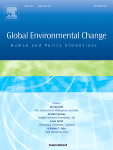Inland Fisheries need to be on policy plate
Add Summary

Inland fisheries – the fresh waters that feed and provide economic support for some of the poorest nations on Earth – need to be a part of national policy statements and programs, a group of fisheries scientists report in a new paper.
In this month’s journal Global Environmental Change, “Inland fisheries – Invisible but integral to the United Nations Sustainable Development Agenda for ending poverty by 2030” outlines how Including inland fisheries in national policy statements and programs can promote economic and social growth for the poor and prevent further poverty escalation.
“Inland fisheries are an important part of resilient livelihoods for many people around the world and offer substantial contributions towards preventing increased poverty and, in some cases, alleviating poverty,” said So-Jung Youn, a PhD student in Michigan State University’s Center for Systems Integration and Sustainability (MSU-CSIS). “This paper aims to highlight the significant role inland fisheries can play in achieving the UN Sustainable Development Goals (SDG), particularly SDG 1: No Poverty.”
Inland fisheries are found on every continent except Antarctica. Of the 20 nations that most depend on inland fisheries, the UN classifies eight as low income and seven as lower-middle income.
The UN’s Sustainable Development Goals officially entered into force in January 2016 with 17 goals aiming to end poverty, protect the planet, and ensure prosperity for all by 2030. The UN is calling on all nations through government, industry and civil society to promote the SDG through specific and measurable targets and indicators.
Scientists at MSU and across the world have been working to build momentum to “give fish a voice,” arguing that in competition for water resources – for energy, agriculture, development – fish resources often are overlooked. Data to reflect both economic and nutritional impact can be scant, making it easier to overlook its importance.
The group created a story map and the narrated slideshow.
In addition to Youn, the article was written by Abigail Lynch, Ian Cowx, E. Fluet-Chouinard, S.M. Glaser, S.C. Phang, T.D. Beard, S.D. Bower, J.L. Brooks, D.B. Bunnell, J.E. Claussen, S.J. Cooke, Yu-Chun Kao, K. Lorenzen, B.J.E. Myers, A.J. Reid, and J.J. Taylor. Lynch received her doctorate degree from MSU-CSIS, and Kao is affiliated with the center as a post-doctoral research associate.



 Print
Print Email
Email

